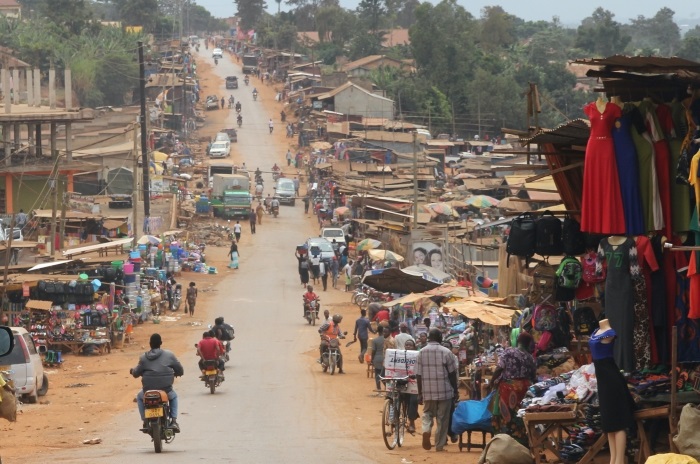When Sarah* ploughed into her husband with her car on the driveway of their two-storey house in an affluent suburb of Kampala, she was arrested and charged with capital murder. At her trial, the prosecution contended that the couple had lived a seemingly charmed life, and therefore Sarah deserved the death penalty. What did not come up in court was the coercive control that Sarah’s husband had exerted over her for years, giving her absolutely no access to money. The large house she lived in was furnished with plastic chairs; the car she used to kill him only had fuel if he sent someone else to the petrol station to pay for it. Living an outwardly affluent life, she never had her own money. It – along with almost everything else in her life – was controlled by her husband.
Uganda has the tenth highest lifetime prevalence of domestic violence in the world; 65% of women report having experienced it. Abuse is not the domain of the least privileged in society – it cuts across tribe, socio-economic status and region, affecting women throughout the country: rich and poor, educated and illiterate, country folks and city dwellers. Sarah is one of a number of educated, middle class women who in recent years have faced capital murder charges for killing their spouses. Domestic violence is not a defence under Ugandan law. As a result, when a woman kills her abusive partner, she is treated as an offender, and can face the death penalty if convicted.
Domestic abuse takes place within a larger context of gender-based oppression, and in Uganda, it represents part of a problem of the lack of gender equality and equal rights under the law. Domestic violence against women in Uganda is a result of a patriarchal society where social norms and gender expectations create attitudes of acceptance around domestic violence. Victims can expect little in the way of formal remedy: in 2020, of the 17,664 cases of domestic violence reported to the police, only 1,359 were prosecuted, and 400 resulted in conviction – a conviction rate of only 2.2%. Abuse thrives in the absence of effective law enforcement efforts to prevent it. With little societal or legal support, some women, like Sarah, will resist domestic violence by killing their abusers.
The Domestic Violence Act of 2010 was enacted to help combat the culture of impunity, criminalising physical, sexual, emotional, verbal, psychological or economic abuse. But implementation has been problematic, and the number of domestic violence-related homicides has almost tripled since its passage (440 in 2020, compared with 159 in 2010, according to police figures).
Given that the vast majority of instances of domestic abuse are never reported to the police, domestic violence will often only come to the attention of police when either the victim or perpetrator is killed. In Uganda, more men than women are killed as a result of domestic violence – with cultural attitudes condoning violence against women in the domestic sphere, women take the law into their own hands. They then face further victimisation in the criminal justice system, where they will be tried, convicted, and can be sentenced to hang for killing their abusers.

Photo credit: Antoine Pluss via Unsplash.
Data is not released on the number of women who kill their abusers, nor on the number of women on death row, so there is a knowledge gap as to the extent of the problem. A study using a convenience sample of incarcerated women serving prison terms estimated that about a quarter of all homicides committed by women in Uganda are against a domestic partner, while anecdotal evidence would suggest that majority of women on death row were sentenced for murdering an abusive partner. This follows a global trend, where female death row inmates are predominately sentenced to death for killing a partner or family member in the context of gender-based violence. Gender discrimination does not end there: while Presidential pardons in Uganda have been extended to condemned men who have killed their partners, no woman has ever been spared the noose by the President, regardless of her crime.
The death penalty is no longer mandatory in Uganda, since the Susan Kigula decision [i] was upheld in 2009. In theory, women could now present evidence of domestic abuse as a mitigating factor when facing capital charges, and there have been some promising developments whereby judges have recognised the role of prolonged domestic abuse in female perpetrated homicides (for example, Uganda v Nsenga;[ii] Uganda v Draru[iii]), but it is not clear how often domestic abuse is presented as a mitigating circumstance, or how often it is successful in Ugandan courts.
Abused women, like Sarah, face systematic discrimination in the criminal justice system, both as victims and offenders. Their experience of domestic violence is culturally condoned and judicially disregarded, leaving them without recourse to protect themselves; when the culmination of abuse leads to some women killing their abusers, their experience of abuse is not considered a defence and rarely appears to be considered a mitigating circumstance, resulting in victims of domestic violence facing the death penalty.
A new research project we are undertaking at the Human Rights and Peace Centre in Kampala seeks to explore the experience of women convicted of killing their violent partners in Uganda. The research focuses on examining court records to uncover any gender bias in sentencing for female and male perpetrated partner homicides, and understand the role domestic abuse plays, if at all, in sentencing decisions. A secondary part of our research involves interviewing women sentenced to death for killing their abusive partners, to gain an insight into the female experience, as victims of abuse and subsequently offenders in the criminal justice system. The knowledge gained from this study has the potential to inform public policy in regards to the issue of domestic violence and the legal response to it, which we hope to achieve through sensitising and educating stakeholders within the criminal justice system as to how to support victims of domestic violence, and ensure fair and compassionate treatment of women who kill their abusers.
 |
Dr Diana Peel is a researcher at the Human Rights and Peace Centre at Makerere University in Kampala, Uganda, with a research focus on punishment in sub-Saharan Africa. |
* Name changed to preserve anonymity.
[i] Attorney General v Susan Kigula and 417 Others (Constitutional Appeal 3 of 2006) [2009] UGSC 6.
Share:
